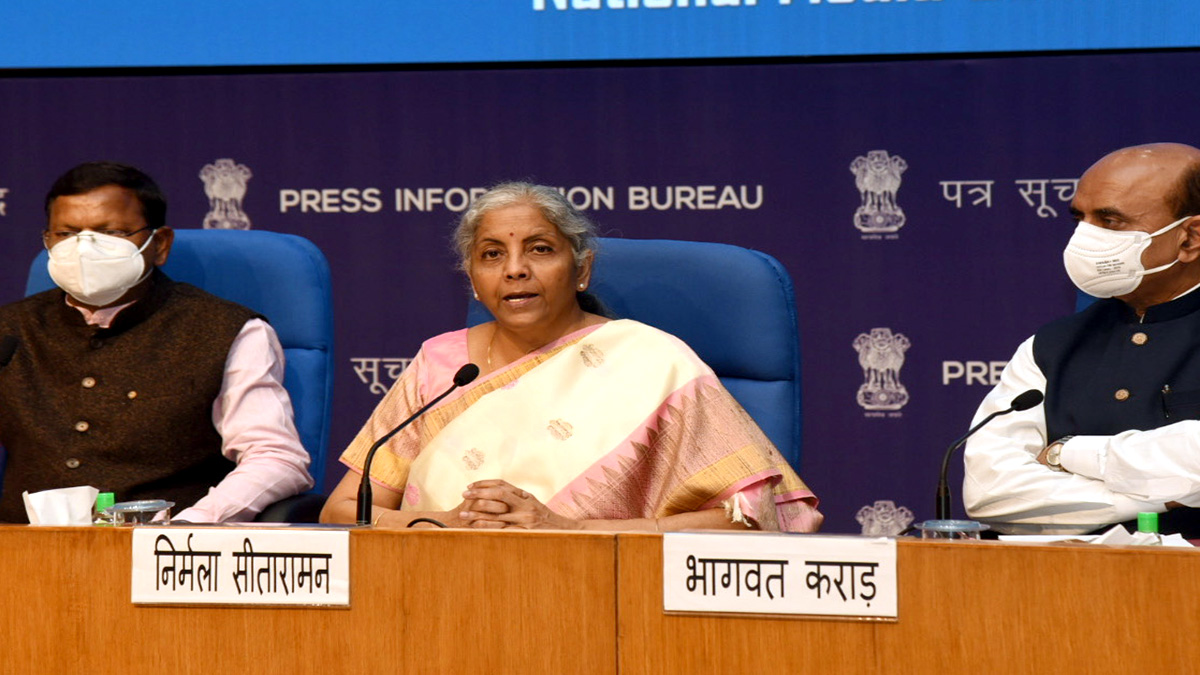“We are marking Azadi ka Amrit Mahotsav, and have entered into Amrit Kaal, the 25-year-long lead up to India @100” said the Union Finance and Corporate Affairs Minister Smt. Nirmala Sitharaman while presenting the Union Budget 2022-23 in the Parliament. Minister stated that this Budget seeks to lay the foundation and give a Blueprint to steer the economy over the Amrit Kaal of the next 25 years “from India @75 to India @100.”
The Minister said that the all-inclusive Welfare focus wherein complementing Macro Economic level growth focus with the Micro Economic level; promotion of digital economy and Fintech, technology enabled development, Energy Transition and Climate Action; and reliance on virtuous cycle from private investment with Public Capital Investment in order to crowd-in private investment are the areas in which we achieve our vision by attaining certain goals in coming 25 years.
She stated that PM GatiShakti; Inclusive Development; productivity enhancement & investment, Sunrise opportunities, Energy transition and Climate action; and financing of investments are the 4 priorities of this futuristic and holistic budget.
Masood Mallick, Joint Managing Director -Ramky Enviro, said, “The Union Budget 2022 has articulated a very clear focus on four pillars of Sustainable Development – inclusive development, productivity enhancement, energy transition and climate action and I see this as a very significant milestone. We welcome the announcements she has made towards strengthening India’s response to climate change. Announcements such as allocation of ₹60,000 crore for providing access to tap water to 3.8 crore households; pilot projects for conversion of coal to clean energy via gasification; allocation of ₹19,500 crore for PLI for manufacturing of high-efficiency solar modules; programs to aid sustainable urban mobility including special mobility zones with zero fossil fuel policy & formulation of a battery swapping policy for Electric Vehicles (EV) charging stations; are all steps that will bring us closer to our SDGs.”
Highlighting the fact that with the estimated growth of 9.2% in the current year and India being the highest among all large economies, the Finance Minister said that this futuristic and inclusive budget continues to provide impetus for growth, which would ensure direct benefit to our Youth, Women, Farmers, the Scheduled Castes and the Scheduled Tribes. PM GatiShakti shall guide ‘big public investments’ for modern infrastructure to be benefitted by the synergy of Multi-Modal Approach. She further said that the country’s strong resilience is being reflected in the sharp rebound and recovery of the economy.
Bhupesh Arora, Business Head – Digital Energy, Schneider Electric, said, “Finance Minister’s announcement of major allocations aimed towards increasing renewable energy, empowering energy efficiency, and grid-connected energy storage will bring forward change and forge our future with actionable, result-oriented outputs. These endeavours will be instrumental in driving the greater goal of carbon-neutrality and powering a net-zero future with digitalization at core. The implementation of town planning schemes, modernization of building bylaws, and transit-oriented development for urban capacity building will have a direct contribution to the achievement of our sustainability goals.”
Nari Shakti has been identified as the harbinger of the country’s bright future and for women-led development during the Amrit Kaal, the 25-year-long leadup to India@100, in the Union Budget presented in the Parliament by Nirmala Sitharaman, Union Minister of Finance. Prime Minister in his Independence Day address had set-out the vision for India@100.
Nandita Tripathi, Partner & Tax Sector Head- ENR, KPMG India, said, “Budget 2022 is directionally good – signals policy stability, is growth oriented and strongly inclined towards a favourable investment ecosystem. Aligned to India’s overall global commitment of tackling climate change, the FM tabled finite steps demonstrating clear focus on clean energy, electric mobility, domestic capacity building and energy transition. Benefit of lower tax rate being extended for manufacturing companies for one more year will provide more room for EV manufacturing in a cost competitive environment. Further, allocation of INR 19,500 crore for PLI scheme for manufacturing of high-efficiency modules is expected to boost domestic module manufacturing.”
Recognizing the importance of Nari Shakti, the Government has comprehensively revamped the Schemes of the Ministry of Women & Child Development. Accordingly, three Schemes, namely, Mission Shakti, Mission Vatsalya, Saksham Anganwadi and Poshan 2.0 were launched recently to provide integrated benefits to women and children.
Saksham Anganwadis are a new generation anganwadis that have better infrastructure and audio-visual aids, powered by clean energy and providing improved environment for early child development. The Union Finance Minister announced that two lakh anganwadis will be upgraded under the Scheme.
Sanjeev Sharma, Country Head and Managing Director of ABB India, said, “It is progressive budget and is likely to add to ongoing growth momentum on supply and demand side. The capex friendly budget orientation is positive for growth levers of the economy. The expected push on infrastructure with special focus on transportation, water & wastewater, data centres and food processing will create further opportunities for deployment of energy & data economy friendly technologies for the global engineering technology companies in the country.”
The outlay for the ‘Scheme for Financial Assistance to States for Capital Investment’ has been enhanced from ₹10,000 crore in BE 2021-22 to ₹15,000 crore in RE 2021-22, stated the Union Finance and Corporate Affairs Nirmala Sitharaman while presenting the Union Budget 2022-23.
Sitharaman proposed to allocate ₹1 lakh crore to assist the states in catalysing overall investments in the economy for 2022-23. These fifty-year interest free loans are over and above the normal borrowings allowed to the states
FM announced that in 2022-23, in accordance with the recommendations of the 15th Finance Commission, the States will be allowed a fiscal deficit of 4% of GSDP of which 0.5% will be tied to power sector reforms, for which the conditions have already been communicated in 2021-22.
She said that the Central Government is committed to bolstering the hands of the States in enhancing their capital investment towards creating productive assets and generating remunerative employment.




